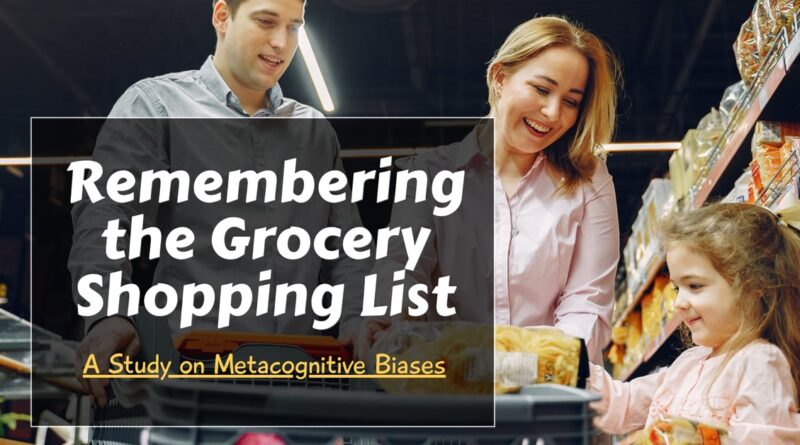Remembering the Grocery Shopping List – A Study on Metacognitive Biases
Introduction
In our fast-paced lives, grocery shopping is an essential task that most of us undertake regularly. A well-prepared grocery list can make this chore efficient, saving both time and money. However, have you ever found yourself at the store, struggling to remember what was on that meticulously crafted shopping list you left at home? We’ve all been there! In this article, we delve into the fascinating world of metacognitive biases and their impact on our ability to recall grocery shopping lists accurately.
Understanding Metacognition and Memory Biases
Metacognition refers to our ability to think about our thoughts, knowledge, and cognitive processes. It encompasses self-awareness and self-monitoring, which are crucial for our memory and decision-making. Memory biases, on the other hand, are distortions in our memory retrieval process caused by various internal and external factors.
When it comes to remembering a grocery list, metacognitive biases can come into play. For instance, the illusion of knowing, where we believe we know the items on our list perfectly, may lead to overconfidence. Additionally, the familiarity bias can make us think we’ve included an item when we actually haven’t. Understanding these biases can shed light on why we sometimes forget essential items despite believing we’ve remembered everything correctly.
The Fallibility of Human Memory
Human memory is not as infallible as we might like to believe. It is susceptible to numerous limitations and distortions. External factors like distractions in the store, stress, or multitasking while shopping can interfere with memory recall. Have you ever tried to remember your grocery list while juggling a phone call or responding to messages? The outcome is often less than perfect.
Moreover, common memory errors, such as the misinformation effect or source amnesia, can further lead us astray. We may inadvertently substitute an item on the list for a similar one due to misleading information or simply forget where the list came from in the first place.
The Grocery Shopping Experiment
Researchers have conducted experiments to explore how metacognitive biases affect our ability to remember grocery lists. In these studies, participants were asked to create and memorize a shopping list before being sent into a store to shop. The results were eye-opening. Even when participants were confident about their memory, they often missed items or substituted them with others. The study highlighted that our beliefs about our memory are not always reliable indicators of its accuracy.
Factors Influencing Memory Accuracy
To improve our memory accuracy while shopping, it’s essential to understand the factors influencing it. External factors like distractions, noise, and time pressure can significantly impact how well we recall our lists. By acknowledging these influences, we can take steps to minimize their impact, such as shopping during quieter hours or making lists when we have ample time to focus.
Moreover, individual differences in memory capacity and cognitive load can vary among people. While some may have an easier time recalling a comprehensive list, others might benefit from chunking items into categories or using mnemonic devices. Tailoring our approach to our cognitive strengths can significantly enhance memory accuracy.
Implications and Applications
The findings from these studies have broader implications beyond just grocery shopping. Understanding metacognitive biases and memory limitations can help us become more aware of our cognitive blind spots in various aspects of life. It can be applied to other memory-related tasks, such as studying for exams or making important decisions based on information retention.
For grocery shopping, being aware of metacognitive biases allows us to be more mindful when creating our lists and while shopping. By acknowledging the limitations of our memory, we can adopt strategies like reviewing the list before entering the store or using smartphone apps to maintain an updated list.
Conclusion
Remembering a grocery shopping list might seem like a simple task, but the underlying cognitive processes are far more complex. Metacognitive biases and memory limitations play significant roles in how accurately we recall our lists. By understanding these factors, we can improve our shopping efficiency and avoid those frustrating moments when we return home only to realize we’ve forgotten a crucial item.
As we continue to explore the intricacies of our minds, we gain valuable insights into our cognitive processes. Armed with this knowledge, we can navigate the challenges of memory and decision-making with greater awareness and make the most of our grocery shopping experiences. So, the next time you head to the store, remember the power of metacognition and put it to work for a successful shopping trip!

